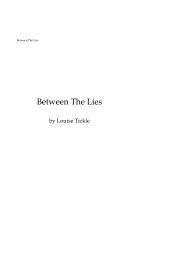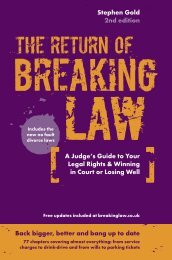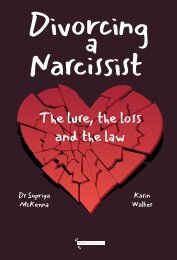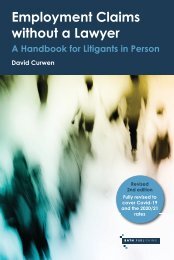Insolvency Made Clear: A Guide for Debtors
Plain English, practical guidance for anyone facing demands over a debt they are struggling to pay.
Plain English, practical guidance for anyone facing demands over a debt they are struggling to pay.
Create successful ePaper yourself
Turn your PDF publications into a flip-book with our unique Google optimized e-Paper software.
Legal Terms Defined<br />
A ‘disposition’ of an asset is when that asset is sold or given away. It would include<br />
where security is given over that asset.<br />
A ‘distribution’ is a payment. For example, the Trustee in Bankruptcy may make<br />
a ‘distribution’ to creditors, if the bankrupt held sufficient funds.<br />
The ‘equity’ in a house is the value remaining after the mortgage. This will be the<br />
only meaning of the word ‘equity’ in this book.<br />
‘Estate’ has two distinct meanings. For most of this book, ‘estate’ is used to refer<br />
to the belongings of a bankrupt which they do not keep after the making of a<br />
bankruptcy order. This would include cash in the bank, but exclude their tools<br />
of trade. However, ‘estate’ has a wider meaning in Chapter 10 if someone dies,<br />
and refers to all their possessions.<br />
‘Execution’ of a judgment is en<strong>for</strong>cing it: typically this is a bailiff attending to<br />
remove property to sell and pay off the judgment creditor.<br />
A ‘guarantee’ is an agreement to pay someone else’s debts.<br />
A ‘hearing’ is when the parties speak in front of a judge in a court.<br />
An ‘income payments agreement’ (IPA) is an agreement where someone who<br />
is bankrupt agrees to pay future earnings to their Trustee in Bankruptcy. If<br />
the bankrupt does not agree, the Trustee can apply <strong>for</strong> an ‘income payments<br />
order’ (IPO).<br />
An ‘individual voluntary arrangement’ (IVA) is a <strong>for</strong>mal process which, if 75%<br />
of creditors agree, can lead to the debt of a person being reduced or the debtor<br />
being given more time to pay.<br />
‘Insolvent’ means either ‘unable to pay debts as they fall due’; or alternatively<br />
‘debts are greater than assets’. The first definition is usually easier to prove: if<br />
someone is meant to pay a debt but cannot, they are technically insolvent.<br />
An ‘<strong>Insolvency</strong> Practitioner’ (IP) is a qualified professional, similar to a chartered<br />
accountant who specialises in insolvency matters.<br />
An ‘interim order’ protects an individual from their creditors while they try to<br />
pass an individual voluntary arrangement.<br />
‘Interest’ can be either a) additional money which needs to be repaid when<br />
taking out a loan, or b) the right to some part of property. For example, someone’s<br />
interest in a house might be the first £50,000; or an interest under the<br />
Family Law Act 1996 which entitles them to live there. ‘Interest’ can also be used<br />
xxiii













